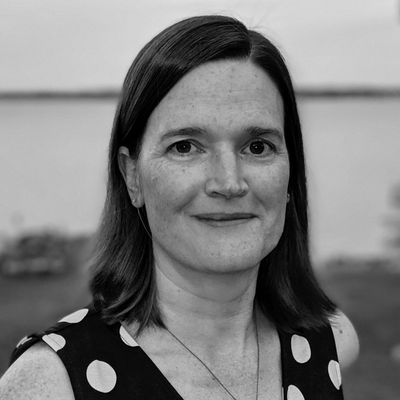ABOVE: UNIVERSITY OF SOUTHERN CALIFORNIA
Darby Saxbe got her start in psychology research early. A self-described “nerdy kid,” she did a science fair study in seventh grade in which she gave left-handed people who wrote with a “hooked” posture and right-handed people a visual test to compare their perception in their left and right visual fields. “I’ve always been sort of curious [about] what makes people different from each other,” she explains.
Growing up in the college town of Oberlin, Ohio, it was easy to envision a career in academia, but Saxbe wasn’t completely sold. When she enrolled at Yale University in 1995, she originally majored in English. After realizing that career prospects for would-be English professors weren’t promising, she gravitated back toward psychology, and graduated with a double major. She moved to New York, working for tech startups and as a freelance writer, but the crash of the dot-com economy in the early 2000s led her to press the restart button on her career by going to graduate school.
She applied to a lab at the University of California, Los Angeles, that was launching an intensive study of the everyday lives of dual income heterosexual couples. Rena Repetti, who heads the lab, recalls that in her admission interview, Saxbe “came across as not only very intelligent, clearly, and very accomplished, but full of energy, full of ideas.”
In the lab, Saxbe proved “an absolute joy to work with,” Repetti says, displaying an impressive ability to “put different strands of research and different research literatures together in novel ways.” Saxbe excels, Repetti adds, at combining biological, psychological, and social research. “I don’t know of anyone, literally, who combines those three strands together as well as she does.”

As part of Repetti’s study, Saxbe monitored cortisol levels in the saliva of participants and compared it to people’s self-reported marriage quality. Levels of cortisol, a stress hormone, normally peak in the morning and then decline. If an individual’s levels instead remain high, it can indicate burnout or chronic stress. Saxbe found that women in lower-quality marriages tended to have less decline in cortisol levels throughout the day compared with their counterparts in happy marriages, while no such relationship existed for men.
Saxbe earned her PhD in clinical psychology in 2009 and went on to a year-long internship at a veteran’s hospital before beginning a postdoc at the University of Southern California (USC) with psychology researcher Gayla Margolin. There, Saxbe continued to pursue her interest in family relationships and cortisol levels, while adding neuroimaging to her toolkit. Using MRI, she scanned the brains of adolescents between 15 and 18 years old as the teenagers viewed videos of either themselves, their parents, or unfamiliar peers displaying positive and negative emotions. Their patterns of brain activation were different depending on whether they were viewing unfamiliar people or viewing themselves or their parents, she found, and the particulars of those differences correlated with whether adolescents engaged in risk-taking behaviors such as shoplifting or drug use.
Saxbe had her two children just before and during her postdoc, and that experience aroused an interest in the changes wrought by the transition to parenthood, she says. After starting her own lab at USC in 2013, Saxbe began a study on expecting couples, focusing particularly on fathers. Men in couples expecting a child completed questionnaires and had their hormone levels measured and their brains scanned before and after the birth of their child, and underwent observation with their babies. Saxbe says that she’s interested in the wide variability—among both individuals and cultures—in fathers’ level of involvement in parenting. In addition, Saxbe notes, “if they are showing changes to their biology or to their brain, it suggests that you don’t need to be pregnant to undergo some of those changes to your physiology.” That study recently wrapped up data collection.
“What’s very unique about what she’s done is . . . making a very compelling case that childbirth is a life event with implications for the health of all family members involved,” says Margolin, who echoes Repetti’s praise of Saxbe’s facility for interdisciplinary work. An example, she says, is Saxbe’s 2020 launch of the USC Center for the Changing Family, which pulls together faculty and trainees from different schools at the university with the idea of “getting people to talk to each other across different fields and make connections.”
Clarification (August 2): The first paragraph of this story has been edited to clarify that Saxbe carried out her study in seventh grade for a science fair.






